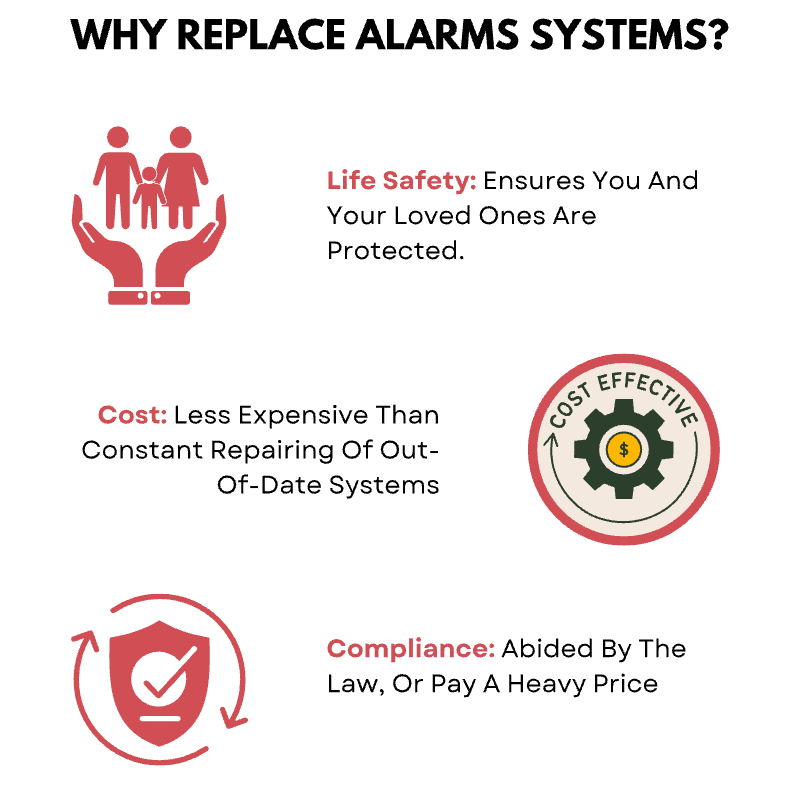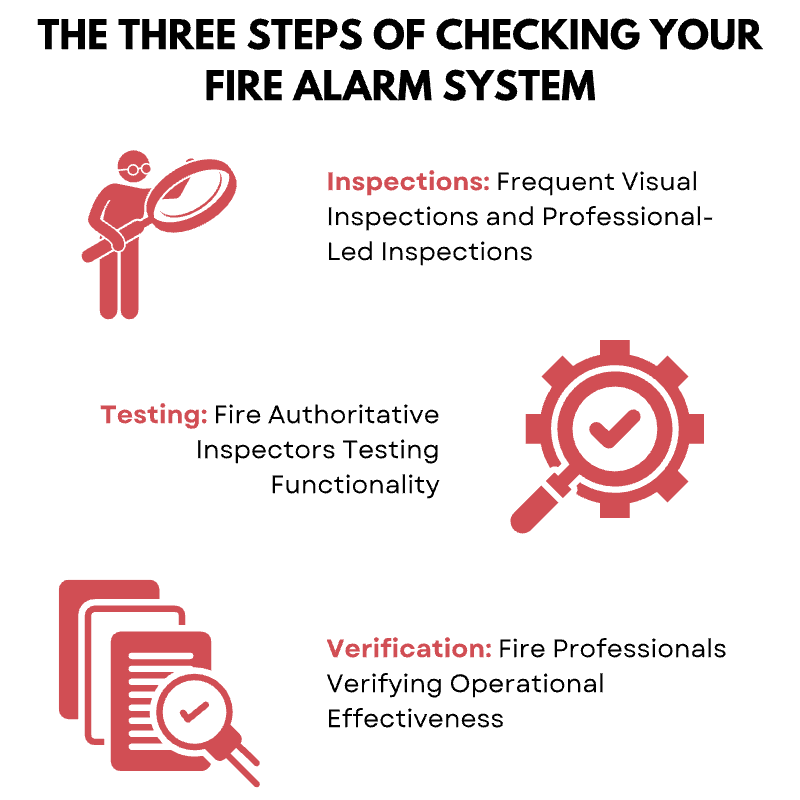Ensuring Longevity and Efficiency: Managing the Life Cycle of A Fire Alarm Systems
Fire alarm systems are integral to an emergency response system against dangerous fires and accidents. Like all other mechanical equipment, at some point in time, the components of fire alarm systems also become unreliable and reach the end of their life cycle. The total life cycle period depends on how well the system has been maintained and used.
Importance Of Replacing At The End Of A Life Cycle
Compliance
Organizations like the NFPA (National Fire Protection Association) and OSHA (Occupational Safety and Health Administration) mandate that fire alarm systems be inspected and maintained correctly for the least risk in a dangerous situation.
This also includes replacing components when they are not functioning correctly or malfunctioning. This often occurs when equipment has lived its entire life cycle and can no longer operate at the same level.
To keep in order with the state’s laws and regulations and avoid any significant fines for improper maintenance of your alarm system, it’s best to replace those old parts and keep them in compliance with the government.
Advancing Technological Landscape
The world today is moving faster than ever towards developing technology that we would have thought impossible about ten years ago. Similarly, fire protection systems are also developing in how they can better protect American citizens from any type of fire accident.
The new fire alarm systems are better at detecting dangers, proactively acting against them, and decreasing the cost of property damage. These systems are developing every day, and to keep up with the best fire safety measures for any business, replacing your components regularly is a given.
Reliability
Fire alarm systems are part of a complete system that proactively protects a business’s people and property. This proactive judgment is based on the system’s effective functioning during an emergency.
If the system’s architecture contains unreliable components and does not function as it should, there is no reason to have a system that should inform you of any impending danger.
The whole reason for such a system is to know an emergency is happening at that exact moment and to take action simultaneously. That is when you see a system is reliable and hence don’t have to worry about the safety of your environment.
Reduction of False Alarms
When a system gets a bit older, and the parts have run out of their life cycle, the components can begin to falter in their operation. Malfunctioning is one major problem that can profoundly impact how an environment operates daily.
A false alarm can disrupt a business’s operations and waste much time on an emergency that didn’t even happen. Similarly, some alarms that automatically alert fire authorities of danger can also disrupt their operations and become useless for both sides.
To avoid all this, the smart route is to replace your alarms when they have run out of life and ensure that malfunctions do not occur for an extended period.
Instilling Confidence
Fire alarm systems are why you can confidently operate your business without thinking about what might happen in a fire emergency. They can take care of whatever problem you might face that occurs unintentionally and can be very dangerous.
Keeping your system updated and in prime condition can save lives and prevent property damage. A study by the NFPA showed that the annual average cost of fire damage for Americans was 7.3 billion dollars. Proper maintenance and replacement of fire alarm system components can nullify this number.
Maintenance Expenditure
Any fire alarm system needs constant maintenance and record-keeping to keep it up-to-date and fully operational. Specific costs will be associated with this, but it will be worth the crunch because of the costs it could save on an unfortunate accident.
A system can only be maintained for so long before it becomes redundant and needs a reboot. Hence, instead of spending money on maintaining a dying system, invest in something new that can work much better than your current model.
It has also been seen that sometimes, replacing a fire alarm system at the right time can be cheaper than maintaining an older system.

Actual Replacement of Fire Alarm System Components
When the time comes for you to replace your fire alarm system components, the question arises as to how you know you have to start this process. Here are some signs that you need to get your system checked and replaced to ensure better safety against fire,
- Age: The first obvious indication that your fire alarm system needs to be upgraded to better components is its age. It must be revamped if it is between 15 and 20 years old.
- Maintenance Difficulties: If parts for your system are more difficult to come by with general manufacturers, the system is outdated and needs a permanent upgrade.
- Monitoring Difficulty: Fire alarm systems today have developed so much that you can know the status of anything you want to know about your system in seconds on your electronic devices. If you find it challenging to monitor your system, update your components and monitor the whole architecture from the comfort of your home.
- Cost For Repair: When the price of repairing your system components starts to get out of hand, you know that it is due for enhancement.
- False Alarms: The increased frequency of false alarms indicates that your system needs replacement. This means the alarms malfunction; you must replace them with better sensors.
- Not Enough Coverage: Your business or building can expand its size, and there may be areas that need additional coverage and are not protected by any fire alarm safety precautions. When developing, ensure you expand your fire protective services, too.
- Regulations: Some regulations and rules for operating your fire protection system may change and get updated as official bodies like the NFPA update their policies. After official intimation, you must make the necessary changes according to what has been mandated.
The Process of Inspecting Fire Alarm System Components
Now, let’s look at some steps you can take during the inspection process of your fire alarm system to maintain efficiency and ensure that it works to its maximum effect. These processes can be conducted by regular people who know what they are doing, but it is advised to let professional technicians handle these processes for better verification and documentation.
- Test your heat detectors to ensure your fire alarms work at the correct temperatures and activate in the expected time frame.
- Check and supervise the circuit panels within the system to ensure they are active and on the right spectrum of an open circuit.
- Test your auxiliary and backup batteries for enough power or make replacements to ensure functioning during power outages.
- Verify whether your fire alarm monitoring organization receives timely alerts to a sample fire emergency.
- Check your additional mechanical parts of the system, like door hold releases and dampers, for proper functioning.
- Test your smoke detectors for proper signaling in another sample fire emergency.
- Check the duct detectors and ensure that no dust or debris has clogged the system, which could lead to malfunctions and a system shutdown.
- Check all the manual call points and pull stations in the system for proper activation and timely intimation to authorities.
- Ensure there are no obstructions to your system components, especially your audibly and visually demanding parts.
- Test the main control panel for functions on the alarms, LEDs, power sources, mechanisms, circuits, lighting, exit routes, and all sensors( heat exposure, smoke, sound, object, light).

Maintain Your Alarm Systems and Reap The Benefits
This blog gave you a guideline for what could be done to your alarm system so that it functions exactly how you need it to and explained why fire alarm systems need to be replaced from time to time to ensure the safety of individuals.
The overall cost of maintaining and replacing your fire protection systems is much lower than the expenditure you would face from an actual fire accident. Although it may seem unnecessary, fire alarms are a primary component of fire protection systems, and even if you don’t need to use them, your business will always be protected from any external harm.
If you need more information about the importance of accessibility in a fire alarm system and the overall usefulness of service agreements for these systems, check out our in-depth blog and look at our vast library of 500+ checklists that can help make these processes much more effortless.
Explore more templates
Inspect and maintain your fire alarm system components for dust and debris buildup with our checklist.
Plan for the replacement of end-of-life components in your fire alarm system with our checklist.
Inspect your fire alarm system components for heat exposure with our checklist
Tailored to meet your specific requirements, enabling you to manage
inspections and reports with greater detail and efficiency
ZenFire is a lot more customized to my business. Before I was using a generic app, I could not customize, like I do now."

